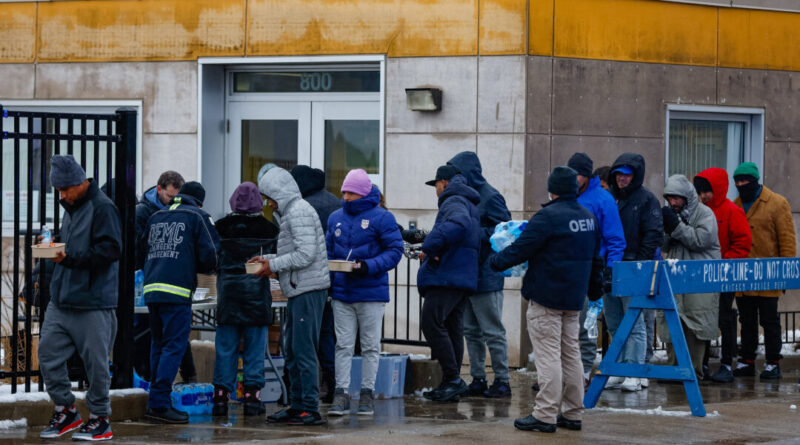Chicago Community Prepares for Potential Deportations of Undocumented Immigrants
Local officials emphasize that undocumented immigrants should be aware of their rights, adhere to the law, and devise a plan for their children’s care.
CHICAGO—Residents of Little Village, a largely Mexican community on the southwest side of Chicago, are on high alert for potential mass deportations of undocumented immigrants following President Donald Trump’s inauguration.
According to local leaders assisting immigrants in their preparations, there is growing concern about the impending actions of Immigration and Customs Enforcement (ICE) in the area.
Trump’s vow to launch the most extensive deportation campaign in U.S. history has cast a shadow over W. 26th Street, usually a vibrant commercial hub in Little Village.
Referred to by locals as “La Villita” or “the Mexico of the Midwest,” Little Village serves as a major gateway for Mexican immigrants, including many who have entered the country illegally.
“Anxiety and fear are genuinely disrupting day-to-day life, leaving people in a state of unease,” Jennifer Aguilar, executive director of the Little Village Chamber of Commerce, noted to The Epoch Times. “Walking along the corridor today, it resembled a ghost town.”
Laura Gutierrez Ramos, owner of Nuevo Leon restaurant, shared with The Epoch Times, “People are frightened. You can’t fault them.”
Tom Homan, the newly designated border czar, stated in a January 21 interview with CNN that the ICE deportation efforts—focused primarily but not exclusively on undocumented individuals with criminal histories—have already commenced.
Homan explained that the operations target those deemed a risk to public safety, specifically illegal immigrants with criminal convictions. “[ICE officers] are aware of precisely who they’re searching for and generally know where to locate them,” Homan added.
Homan also mentioned that if other undocumented immigrants are discovered alongside the targeted individual, they too will be apprehended. “When we pursue our primary target, who is a criminal alien, if they’re with others in the U.S. illegally, we will enact enforcement against them,” he stated.
“This marks a departure from the previous administration; ICE will enforce immigration laws effectively. There’s nothing in the INA (Immigration and Nationality Act) that stipulates a serious crime conviction is necessary for removal from the country.”
To counter misinformation and reduce community anxiety, Aguilar indicated that local leaders are reaching out to business owners and residents, providing guidance on interacting with ICE agents.
“Our goal is to inform them about preparation so they aren’t caught off guard,” Aguilar remarked. “Being informed of your rights is crucial.”
She also urged immigrants not to flee from law enforcement, which could create probable cause for detention, and stressed the importance of planning for childcare in case they are detained.
Leaders in the sanctuary city have already distributed around 1,000 flyers and aim to reach every business along the W. 26th Street corridor.
Ramos, whose family-run restaurant has been a neighborhood staple for over 47 years, expressed her willingness to comply with ICE inquiries about her employees while being aware of her legal obligations.
“If they arrive with a list of names, I’ll confirm their presence. However, if they request to review I-9s for all employees, I’m not obligated to do so if they’ve worked here for three years,” she explained, referring to the form used to verify an employee’s identity and immigration status.
Aguilar and Ramos believe that a significant deportation initiative would devastatingly impact the local economy as area businesses rely on individuals willing to work.

Jennifer Aguilar, executive director of Little Village Chamber of Commerce, appears in the chamber offices in Chicago on Jan. 21, 2025 Lawrence Wilson/The Epoch Times
“Trump is intelligent and has a business background,” Ramos remarked. “Ultimately, I hope he refrains from actions that could potentially harm the U.S. economy.”
The report cites U.S. Census Bureau data revealing that of over 580,000 Chicago residents, 21.5 percent are of Mexican heritage, which includes 44 percent of the city’s cooks.
“Little Village is known for having the second largest commercial corridor after Michigan Avenue,” Aguilar commented.

Laura Gutierrez Ramos appears in the dining room of her restaurant, Nuevo Leon, in the Little Village neighborhood of Chicago on Jan. 21, 2025. Lawrence Wilson/The Epoch Times
Aguilar believes that emphasizing deportations might inadvertently challenge the stereotype that all immigrants are criminals or taking jobs away from others.
She hopes this will shine a light on the valuable roles immigrants play as farm laborers, meatpackers, and service workers—and the detrimental effects their sudden removal would have on the economy.
“The ideal outcome from this situation would be a resolution that tackles the issue comprehensively, allowing individuals to legalize their immigration status,” Aguilar suggested for those who are undocumented.
Ramos remains optimistic that the deportation efforts will strengthen community bonds.
“Our community is our foundation,” she stated. “We support one another. God is good. We will overcome.”




